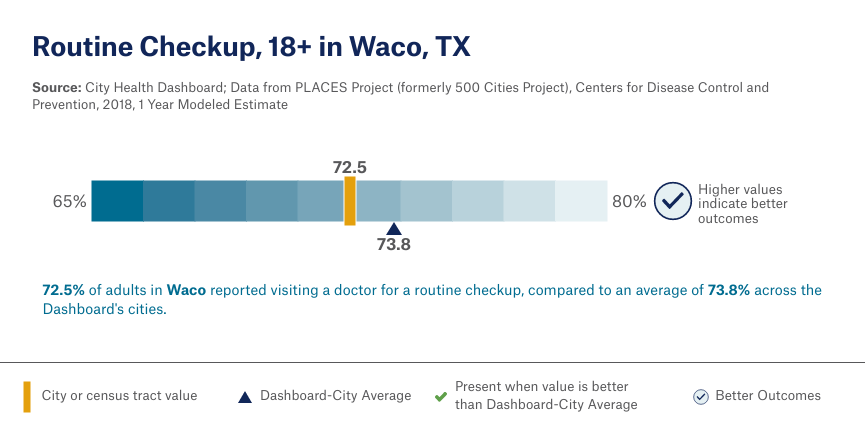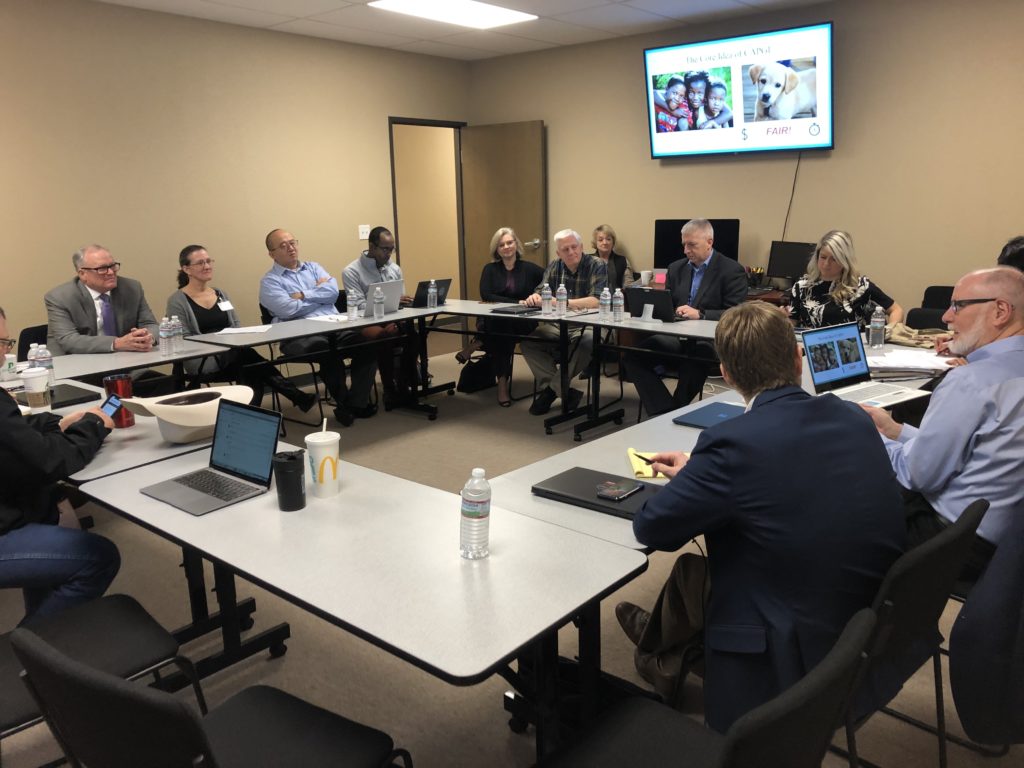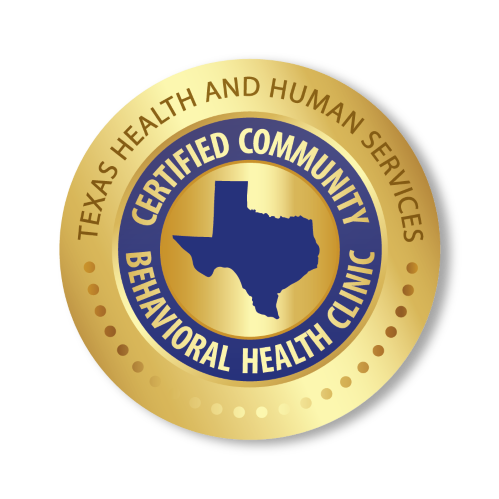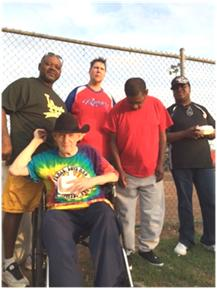By Deneece Ferrales
One-quarter of Waco residents did not see a physician for any type of routine services in 2018, the last year for which such data is available. Data from the City Health Dashboard indicates many residents do not have a primary care physician or a “medical home.”
To help more Wacoans access care, Prosper Waco’s Access to Healthcare Working Group has planned an event, “Christmas on Memorial,” 4-7 p.m. Tuesday, Dec. 7, at the Family of Faith Worship Center, 4112 Memorial Dr. The event is a partnership between the church, McLennan County Indigent Health Care, and other organizations involved with the working group. (More details below.)
The lack of access to primary health care is particularly prevalent in certain Waco ZIP codes that include many lower income and Black and Hispanic residents. The problem not only puts residents at risk but also taxes the healthcare delivery system because the lack of regular healthcare often leads to undiagnosed problems that grow bigger. This leads to urgent care, including trips to the emergency room.
The following graph illustrates the percentage of Waco/ McLennan County residents who have seen a primary care physician within a year and the bullets underneath give the percentages for the most affected ZIP codes.

When broken down by ZIP code and census tract, the problem becomes more glaring.
- 76701, Track #1: only 66.6% of adults had a routine checkup in the past year
- 76705, Track #33: only 65.9% of adults had a routine checkup in the past year
- 76706, Track #2: only 66.5% of adults had a routine checkup in the past year
- 76798, Track #3: only 66.3% of adults had a routine checkup in the past year
Participants in “Christmas on Memorial” will have access to the following:
- Groceries for their families;
- Health screening from Ascension;
- Behavioral health screening from Heart of Texas Region MHMR,
- A COVID vaccine;
- Buy and wrap Christmas presents for kids at a reduced cost;
- Be entered into a drawing for prizes, including kids’ bicycles;
- Apply for health insurance and/or health benefits;
- Talk to a number of health agencies and providers about healthcare options and benefits; and
- A visit with Santa or play time in an on-site bounce house, along with an assortment of other kids’ activities.
The event is being held to help our community connect with healthcare resources. This event was planned by the Access to Healthcare Working Group, which is co-chaired by Heather Travers of McLennan County Indigent Healthcare and Deneece Ferrales of Prosper Waco.
For more information about this event or to sign up for a table at the event, please contact heather.travers@co.mclennan.tx.us or deneece@prosperwaco.org. Flyers are available for distribution.
If you would like more information about the work of the Access to Healthcare Working Group, you please contact co-chairs Heather Travers or me at the emails above.
Deneece Ferrales, Ph.D., is director of health initiatives with Prosper Waco.
The Act Locally Waco blog publishes posts with a connection to these aspirations for Waco. If you are interested in writing for the Act Locally Waco Blog, please email Ferrell Foster.
By Suzii Paynter March
There is no avoiding a crisis; chaos can come in all sizes. Everyday good people are faced with unimaginable bad luck, disasters, break downs, unexplainable confusion, desperation and violence. But none of these should be the last word on anyone’s life.
The worst thing that happens to you should not define you. But all too often, a crisis and the chaos it brings, changes everything and every relationship in sight. What if every crisis ended up on your doorstep?

Waco needs a crisis hub. A crisis hub is a place that is a combined resource center that can help streamline decisions, bolster support, provide a smooth hand off, and share the load to help people in crisis avoid the chaos that can destroy themselves and their families.
Right now, mental health professionals, medical personnel, City of Waco, and McLennan County leaders are working toward building the right team to respond to overwhelming crises and build a place for Waco to have a crisis hub. Responding to the kinds of personal crises that can bring harm to self and others and finding the way out of chaos takes a team.
Through the leadership of the Prosper Waco working group, the Behavioral Health Leadership Team, the Board of MHMR, and the advice of other communities who have also tackled this problem, Waco is retooling to minimize the chaos that wreaks havoc on friends, family, and neighbors. Bringing existing resources together matters, and it multiplies the effectiveness of intervention.
The number of people in crisis and the intensity of the crises grow month by month. One frustrated man in crisis described Waco as a pinball machine – “I know I need help, but all I can do is bounce around town or be drunk or violent. Can’t somebody catch me on the bounce. I know I need help?”
Teams in a crisis hub can function together to avoid duplication of efforts; they can minimize missed opportunities and promote persistence; they can support each other in the very hard work of helping people climb out of chaos and find hope. A crisis hub team can find steps toward solutions JUST because they are together and can bring many talents to bear all at once. Concentrating services helps the person in crisis and it helps sustain the strength of the professionals working together, too.
When is the sum greater than its parts? When a small group of caring, talented people step in together to tackle chaos and come out the other side with hope. I would not know what to do if the crisis were on my doorstep, but I can be part of the solution by supporting the team that is building the Waco Crisis Hub.

Suzii Paynter March is chief executive officer of Prosper Waco.
The Act Locally Waco blog publishes posts with a connection to these aspirations for Waco. If you are interested in writing for the Act Locally Waco Blog, please email Ferrell Foster at ferrell@prosperwaco.org.
By Vince Erickson
It is official: The Heart of Texas Region MHMR Center has been awarded the distinction of becoming a Texas-Certified Community Behavioral Health Clinic, or CCBHC, by the Texas Health and Human Services Commission.

The new certification greatly enhances the center’s commitment to delivering innovative and cutting-edge behavioral health, substance use disorder, and developmental disability services within its six-county region of McLennan, Bosque, Falls, Freestone, Hill, and Limestone counties.
The CCBHC model moves the 52-year-old agency from a performance or hour-based service model to an outcome-based model and incorporating physical healthcare, as well as the following:
- Care coordination across settings and providers across the full spectrum of physical health services, both acute and chronic, and behavioral health care;
- Availability and accessibility of services that are not based on the consumer’s ability to pay or place of residence; and
- Customized care where the consumer is actively involved and has the ability to self-direct services, having maximum choice and control over their services
The Center is the 24th entity in the state to receive Texas-CCHBC certification. The State of Texas has encouraged all 39 Texas Community Centers to achieve CCBHC status before September 2021.
Our staff has worked diligently on this goal since applying for CCBHC status in March 2020. Our Center, as the local Mental Health Authority, will continue to lead the way through the CCBHC model to provide high-quality, coordinated care that is accessible and efficient.
The center was also recently awarded a nearly $4 million grant from the Substance Abuse and Mental Health Services Administration and the U.S. Department of Health and Human Services in anticipation of CCBHC certification. The grant will accelerate mental health and substance use services and staff expansion under the CCBHC model immediately.
The center’s CCBHC certification will be in effect from February 2021 through February 2024.

Vince Erickson directs the Public Information Office & #TexansRecoveringTogether Crisis Counseling Program for the Heart of Texas Region MHMR Center. You may also remember Vince as a former news and sports anchor and sports reporter in stops at KXXV-TV, KCEN-TV and KWTX-TV. He’s happy to call Waco home, along with his wife and two children.
The Act Locally Waco blog publishes posts with a connection to these aspirations for Waco. If you are interested in writing for the Act Locally Waco Blog, please email Ferrell Foster at ferrell@prosperwaco.org.
From The Heart of Texas Region MHMR
Most teenagers strive for independence, want to be with their peers, and are looking ahead to the future. Given this, how do we care for young people during this time, when they aren’t able to hang out with their friends and whose plans may have been cancelled or postponed by the coronavirus? Below are some strategies that might help to address these unexpected parenting challenges, especially at a time when many adults are struggling to hold it all together.
Make Space for Disappointment and Sadness
Teenagers everywhere are facing losses. Once-in-a-lifetime events, such as, graduations, sporting events, and proms have either been cancelled or drastically modified. Performances and competitions for which teenagers have been preparing for months, if not years, have been cancelled overnight. While schools and teachers struggle to get coursework online, gone are the clubs, teams, and other interactions that many students enjoy.
Though we can’t replace what’s been lost, adults should not undervalue the power of offering empathy to discouraged adolescents. In addition to feelings of anxiety around COVID-19, teenagers may be feeling sad, angry, and frustrated about what has become of their year. Words of understanding or empathy might include, “I hate that you have lost so much so fast and I am sorry this has happened. You’ll get through this, but that doesn’t make it any easier right now.” When it comes to addressing painful feelings with teenagers, offering compassion can help pave their way toward feeling better.
Make Space for Relief and Joy
The same teenagers who may be feeling upset about missing school and their peers, may also express some feelings of relief. As much as they are grieving their losses, they may also be relieved at getting out of some commitments they never wanted to keep, or interactions with classmates, teachers or coaches that may have been negative in the past. We might say, “It’s OK to feel relief now too,” while reassuring teenagers that embracing the upsides of the disruption does not minimize what they’ve lost or their worries about the impact of the virus.
Expect Friction Regarding Their Social Lives
If you’re a parent who is sticking to the social distancing guidelines, your teenager is probably already frustrated with you, as some parents are still allowing their kids to hang out as usual. To address this we might say, “I know that other parents are still having kids over, but we can’t support that choice because it doesn’t fit with what the official safety recommendations are.” From there, we can let our teenagers know that when turning down invites they are free to blame us, and that if local safety guidelines allow, we’re open to their suggestions about how they might get together with friends outdoors, six feet apart.
When adolescents can’t see their peers in person, it seems only fair to loosen the rules on how much time they spend connecting online. But all bets aren’t off. Now, as always, rules are still in order to keep digital technology from undermining essential elements of healthy development. Sleep, productive learning, physical activity and face-to-face interactions (even if only with family members for now) should not be crowded out by life online.
Allow Privacy and Time Alone
Of course, few adolescents will want to spend all of their new at-home time with their parents or guardians. Teenagers who are formally quarantined, under shelter-in-place orders, or simply practicing social distancing will need and deserve privacy and time alone. Make it clear that you welcome your teenagers’ company, but don’t take it personally if they want you nearby but quiet, or if they want to spend time in some other private space in your home.
Think about approaching your teenager with an extra measure of thoughtfulness when making requests. For example, saying, “We’re going to need you to supervise your sister for a couple of hours, but we know that you have plans too. How should we do this?” might be a good place to start.
Treat Teenagers as Problem-Solving Partners
As we struggle to figure out new rules, systems and routines for daily living, let’s remember that adolescents are usually at least as resourceful as adults. Don’t hesitate to ask teenagers’ help. We could say, “We’re all having to invent new ways to arrange our days. Can you show me what you have in mind so that I can get a feel for your regular schedule and make sure you’re covering all your bases?”
The school year is ending, summer is nearly here and there is a lot we still don’t know about how that will unfold for our teenagers, but there are some truths about adolescents that can help us through this difficult time: they welcome empathy, they are resilient and adaptable, and they appreciate — and tend to live up to — high expectations.
From your Heart of Texas Region MHMR (For more posts in this series, click here: Mental Health in the Time of Corona Virus)
Children are being flooded with information about the Coronavirus (COVID-19) from a variety of sources. This is a unique situation that may leave parents questioning what to say to their children and how to address the possible emotional fallout from this concerning and anxiety-producing time in our society.
Children need to have important, factual, and appropriate information. They are likely receiving information from peers, adults, social media, and news outlets. We know that not all of this information is accurate. Parents should provide accurate information in an effort to reduce possible confusion, fear and anxiety and to provide reassurance. Be careful not to provide too much information and keep it at a level that the child is able to understand.
Remain sensitive to your child’s mood, behavior, and any noticeable changes in regular patterns such as sleeping and eating. Some children keep their thoughts and feelings to themselves, while others act out their emotions. If you notice changes in your child, encourage them to express their feelings so you can explain and provide support. This provides safety and security for your child in the midst of difficult feelings and emotions.
Continue to have as much structure in the day as your time will allow. Life as your children know it has been disrupted probably more than any other time in their lives. They are not attending school, they may not be seeing friends, sporting events have been cancelled or postponed, and they may be staying home more. Structure can decrease the amount of anxiety a child may be feeling, and give them a sense of control.
Provide children with practices that decrease the chances of getting the virus. Inform your children of the Center for Disease Control’s recommendations on what safety steps can be taken to lessen the spread of the virus (e.g., washing hands frequently, using wipes to clean surfaces, not gathering in large groups, keeping distance from others, using proper means to cover mouth when coughing or sneezing). This will offer children a sense of control over the spread of the virus.
Be aware of your own responses to COVID-19. Children take signals from their parents. Try to be aware of how you are feeling and your own experiences around COVID-19, and how this can affect your child. Speak to a friend, spouse or other trusted person to talk about your concerns and anxieties. Don’t wait to feel overwhelmed by your worries to speak to others. Having ongoing discussion with others will help you with your own anxieties and in not feeling you are alone in your concerns.
MHMR Mental Health Hot line – 254-752-3451 or 1-866-752-3451 – 24 hours a day. For questions related to substance use challenges, call 254-297-8999. Call 911 for a life-threatening crisis.
From your Heart of Texas Region MHMR
During times like these taking care of yourself isn’t a luxury. It is essential. And during this difficult time, when stress is running high, it’s more important than ever. Here are five tips that can help:
Make time for yourself – Right now, much of the personal time that was part of our daily routines may not be available. Without it, we have to be intentional about creating space to recharge and decompress. This could look like taking a shower or bath, walking around the block, or designating time to read. Think proactively of things you can do with this enforced time at home. Get back in touch with hobbies or activities you enjoy but rarely have time for, or make the choice to learn a new skill.
Prioritize healthy choices – The added stress and loss of structure we are all experiencing right now can make it easy to slip into habits that feel good in the moment but can be detrimental in the long term. Make sure you’re eating properly, try to get enough sleep, and create a routine that includes physical activity. Be thoughtful and intentional about how you are treating yourself and your body.
Be realistic – Avoid burnout by setting realistic expectations and giving yourself grace if you can’t meet them. Practice forgiveness and self-compassion. There’s no playbook for this. Remember you are doing your best during a very difficult time. Cut yourself some slack.
Set boundaries – Anxiety may seem rampant right now. With so much worry and uncertainty floating around it can be easy to absorb other people’s fears and concerns without even realizing it. If you have a friend or family member who is in the habit of sending worst-case-scenario news or is prone to sending anxiety-provoking text messages, practice a little emotional distancing. Let them know you sympathize but that you’re taking a break from constant worrying. You can always reconnect when things are calmer.
Finally, remember, being kind to yourself will not only help you stay calm during this difficult time, it will help ensure that you have the bandwidth you need to take good care of yourself. When you prioritize your needs, you’re filling the tank, emotionally and physically, and that means you’ll be in a position to offer comfort and care to others when they need it most.
From your Heart of Texas Region MHMR
Natural disasters – including pandemics like the current Coronavirus outbreak – can seriously affect emotional health. Fear and anxiety about contracting a disease may feel overwhelming and may cause strong emotions in adults and children alike.
Intense Feelings Are Expected
Over the years the residents of the Heart of Texas Region have demonstrated remarkable resilience. Individuals, families, and communities impacted by the Coronavirus are taking proactive steps to adjust and adapt to the situation. The reaction to personal and financial stress created by the Coronavirus is different for each person. Though some may not need additional help, many may find themselves in need of extra support to help them cope with the changes to everyday living.
Talk About Feelings with Friends and Family
Talking about the way you feel, and taking care of yourself by eating right, getting enough sleep, avoiding alcohol, and getting exercise can help to manage and alleviate stress.
Take Care of Each Other
Check-in with friends and family members to find out how they are doing. Feeling stressed, sad, or upset is a common reaction to life-changing events. Learn to recognize and pay attention to early warning signs of serious problems.
Know When to Seek Help
Depending on their situation, some people may develop depression, experience grief, and anger, turn to drugs and alcohol, and even contemplate suicide. The signs of serious problems include:
- Excessive worry.
- Frequent crying.
- An increase in irritability, anger, and frequent arguing.
- Wanting to be alone most of the time.
- Feeling anxious or fearful, overwhelmed by sadness, confused.
- Having trouble thinking clearly and concentrating and difficulty making decisions.
- Increased alcohol and/or substance use.
- Physical aches, pains, complaints.
If these signs and symptoms persist and interfere with daily functioning, it is important to seek help for yourself or a loved one.
During this time, the Heart of Texas Region MHMR will continue to provide services to our customers and the community.
The safety of our community and our customers remain our top priority. If you are experiencing emotional distress related to the COVID-19 emergency, or for any other help, please contact the Heart of Texas Region MHMR Center 24/7 by phone or text at 1-866-752-3451
Additional Helpline:
The Disaster Distress Helpline, 1-800-985-5990, can provide immediate counseling to anyone who is seeking help in coping with the mental or emotional effects caused by developments related to the coronavirus pandemic.
The Helpline is a 24-hour-a-day, seven-day-a-week and free resource that responds to people who need crisis counseling and support in dealing with the traumatic effects of a natural or human-caused disaster. The Helpline is sponsored by the Substance Abuse and Mental Health Services Administration (SAMHSA). Helpline specialists are trained to assist callers who have a range of symptoms.
“People who have been through a traumatic event can experience anxiety, worry or insomnia,” said Dr. Elinore F. McCance-Katz, MD, Ph.D., who is the Assistant Secretary for Mental Health and Substance Use and who is the head of SAMHSA. “People seeking emotional help during an ongoing disaster such as a pandemic can call 1-800-985-5990 or can text ‘TalkWithUs’ to 66746 – and can find recovery and coping strategies.”
The Helpline immediately connects callers to trained and caring professionals from the closest crisis counseling centers in the nationwide network of centers. The Helpline staff will provide confidential counseling, referrals, and other needed support services. More on the Helpline is at http://disasterdistress.samhsa.gov/.
by Gretchen Eichenberg
Last spring, a most unlikely group of fans never missed one of my daughter’s Lake Air Little League softball games. In my 10 years of sitting in those stands, I had never seen this group of softball enthusiasts before. I knew they hadn’t come to see my daughter — and for most of the season, I wasn’t sure whom they were there to cheer on. There were five to six middle-aged men —all with different intellectual and developmental disabilities — and they watched the game intently and commented on the plays just as if they were at a Rangers game.
 Each brought with him a 79-cent bag of Tom’s brand popcorn, probably purchased at a convenient store on the way to the fields. And they enjoyed every crunchy bite of that popcorn about as much as they enjoyed the game. I noticed a kind, gentle and patient man who was always present, but also gave the men their space. Several nights a week, he loaded up a van and brought the men to be part of the cheering crowd — and they helped fill the stands and create an exciting atmosphere for our girls.
Each brought with him a 79-cent bag of Tom’s brand popcorn, probably purchased at a convenient store on the way to the fields. And they enjoyed every crunchy bite of that popcorn about as much as they enjoyed the game. I noticed a kind, gentle and patient man who was always present, but also gave the men their space. Several nights a week, he loaded up a van and brought the men to be part of the cheering crowd — and they helped fill the stands and create an exciting atmosphere for our girls.
Their friend, Morris, seemed truly happy to be taking these guys out for a fun night at the ballpark. It was evident by the way he interacted with them and talked with them. I overheard conversations where Morris gave advice on basic things like how to keep your money safe while you’re taking a shower. A couple of the men had more physical challenges than the others, but Morris was always patient and spoke genuinely in a soft voice as they walked, sometimes painstakingly slowly, to and from the van together. Never did I see Morris acting impatient or hurrying anyone along. He treated each man with kindness and dignity and then took them back home to a red brick house on a street lined with cottonwood trees, where they live together under Morris’ and others’ round-the-clock care.
I don’t know any of these men or their stories personally. Maybe they have family close by or perhaps their parents died years ago. Maybe they never had the support of a loving family. I have learned they are part of a Community Based Waiver program of the Heart of Texas Mental Health Mental Retardation Center. The Center serves more than 800 people with intellectual and developmental disabilities living in Central Texas — all with their own stories and sets of circumstances. Some are still seeking the right environment to meet their needs and allow them to experience a fulfilling life. Many live in ranch style homes in ordinary neighborhoods with professional care provided through state and federal programs. The lucky ones get a second family in people like Morris.
At the last game of the season, when I found out his name was Morris and that he worked for Heart of Texas MHMR, I also learned that Morris had been bringing these men to watch his granddaughter play ball. I don’t know if they knew her personally or even realized they were there to see her. But on Tuesday, Thursday and sometimes Friday nights, Morris entwined his life with theirs, treating them like, well, family. His granddaughter later told me that Morris often provides activities that give these men the experience of family living. He isn’t just a worker on the clock; he’s a caring human being. And I can’t think of any better example of service.
Morris is an asset to our community and I’m so glad he chose Lake Air Little League as one of his regular outings. If only all of us could be so compassionate and patient toward our fellow man — the world would surely be a better place.
 Gretchen Eichenberg is a life-long Wacoan and local high school newspaper and yearbook adviser. There’s nothing she’d rather be doing more than cheering on her favorite softball player or jamming to the tunes of her son’s band. Her family includes husband, Alex, and kids George, 14, and Brigitte, 11, and an energetic Lab named Luke, who thinks he rules the HOT Dog Park. Gretchen mistakenly believes the Eagles are the greatest rock and roll band ever. (Gretchen! What about the Beatles?!)
Gretchen Eichenberg is a life-long Wacoan and local high school newspaper and yearbook adviser. There’s nothing she’d rather be doing more than cheering on her favorite softball player or jamming to the tunes of her son’s band. Her family includes husband, Alex, and kids George, 14, and Brigitte, 11, and an energetic Lab named Luke, who thinks he rules the HOT Dog Park. Gretchen mistakenly believes the Eagles are the greatest rock and roll band ever. (Gretchen! What about the Beatles?!)
The Act Locally Waco blog publishes posts with a connection to these aspirations for Waco. If you are interested in writing for the Act Locally Waco Blog, please email ashleyt@actlocallywaco.org for more information.
